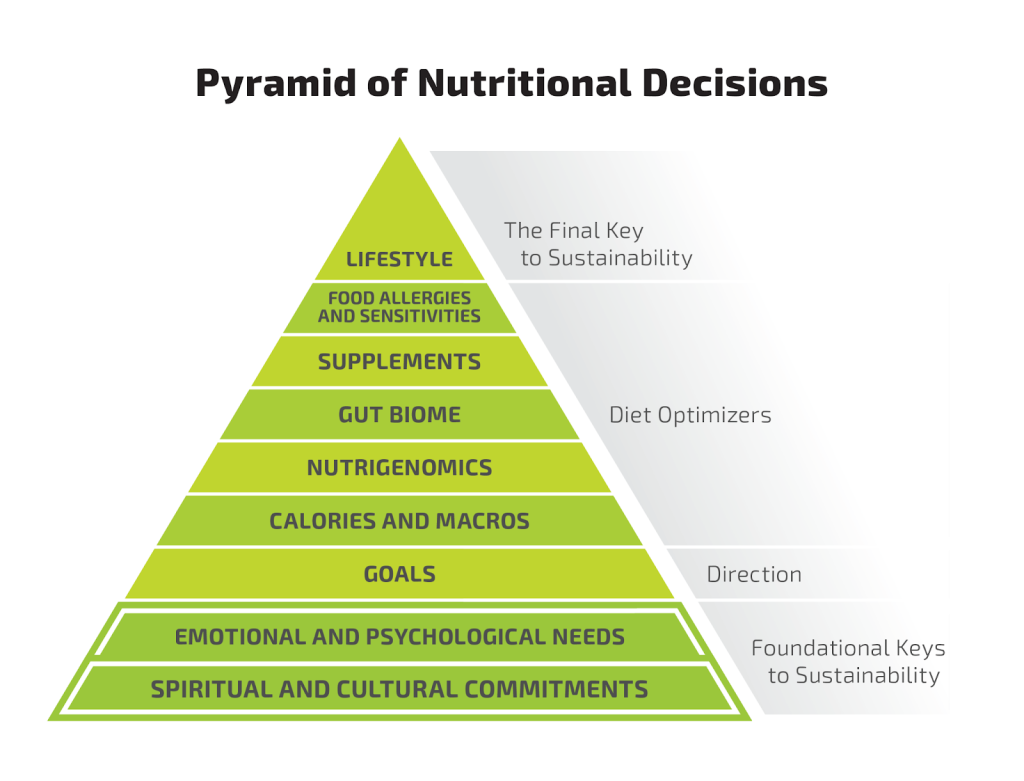
The BiOptimizers Pyramid of Nutritional Decisions


The BiOptimizers Pyramid of Nutritional Decisions
Sometimes, doctors or nutritionists even medically recommend people go on diets. Yet, the longer people diet, the fatter and unhealthier they tend to get. One of the reasons is that they are not following the right diet for themselves.
With so many diet trends and fads promoted all over the internet, it can be difficult to know what to eat and what kind of food lifestyle to follow. However, we at BiOptimizers believe we’ve found the absolute best diet: and it’s the diet personalized to YOUR needs, wants, and unique biological blueprint.
In this article, we will cover:
- Why most diets fail long-term
- Why the “ideal diet” is a food lifestyle that completely meets your needs, wants, and preferences – physically, emotionally, and spiritually.
- The 9 Nutritional Factors that make up the Pyramid of Nutritional Decisions

The Problem With “Diets”
One researcher compared dieting to the Greek myth of Sisyphus, who was tasked with rolling a large boulder up a hill only to see it would fall back down. Many dieters endure a similar plight, faithfully the following diet after diet only to see their scale numbers shoot upward again. Often, their health gets worse in the process too.
Not only are prolonged dieting and yoyo dieting ineffective, they can also be highly detrimental to your physical and mental health. Dieting can cause disordered eating and negative body image among younger adults. Sticking to a cookie-cutter diet plan means you may not get enough nutrients for your body to function optimally.
At what point can we finally say that one-size-fits-all diets just DON’T WORK? We believe there has to be a better way to eat for better health, weight, and performance.
What Is The “Perfect Diet?”

There are some essential components that should be a part of every diet plan or food lifestyle. These include:
- Healthy doses of micro and macronutrients for your health goals.
- Low levels of inflammatory or damaging substances, such as processed foods, artificial colors/flavors, trans fats, etc.
- Lots of “whole” foods – fruits, vegetables, meats from good sources, whole or raw dairy products, nuts, seeds…basically anything that GROWS!
Within these parameters, everything should be personalized for YOU. This includes exact amounts of macro/micronutrients, what foods you eat, and when you eat them . No specific diet plan or program can tell you exactly what to eat as well as your body can.
On top of that, food has always been cultural, emotional, spiritual, and celebratory. Your genetics and microbiome also determine your best nutrition plan. Therefore, we believe that constructing your ideal diet has to consider these factors, which leads to the BiOptimizers 9-tiered Pyramid of Nutritional Decision.
The Pyramid of Nutritional Decisions
So how can you know exactly what it is your body needs? At some point, it becomes intuitive, and you will notice cravings for certain foods and nutrients. But until you reach that point of deep food intuition, you can follow the Pyramid of Nutritional Decisions.
This is unlike any other “food pyramid” that you’ve seen. Rather than trying to dictate what kinds of foods you eat and how much, this pyramid gets you to think about all the key components that affect your mental, spiritual, and physical health in regard to food.
Each pyramid level is important in its own right, but the levels toward the bottom make up the cornerstone of your nutritional health.
Let’s dive deeply into this pyramid and unlock the keys to a sustainable, nutritious lifestyle.
Nutritional Decision Factor #1: Spiritual And Cultural Beliefs
Whatever diet or food lifestyle you choose for your day-to-day nutritional needs, you definitely want choices that coincide with your spiritual and cultural values. Not taking these into account can cause you to have a negative image of the food you eat.
From a spiritual standpoint, some people must avoid certain foods, usually animal products. One of our core founders, Wade Lightheart, found that he benefited immensely from a plant-based diet, partly because he felt more spiritually aligned as a result.
Food avoidance is not the only way to align your spiritual beliefs with the food you eat. Many people who still eat foods like meat prioritize acquiring it from sustainable sources in a way that promotes environmental health. Wherever you are in your spiritual journey, the food you eat can and should align with your beliefs.
From a cultural point of view, we know that humans are highly social creatures, and every culture worldwide has some tradition surrounding eating and eating together. People who follow restrictive diets can find themselves at odds with cultural and social expectations.
Of course, you need to eat the right foods for your body. But sometimes, the “healthiest” food choices aren’t always what everyone else is eating. Feeling boxed in by cultural expectations or the guidelines of a certain diet can lead to disordered eating and a negative view of yourself or your food.
We want to empower you to find the balance between honoring your spirituality, physical body, and community. But if the spiritual and cultural dietary rules don’t agree 100% with your physical need, some supplements and technologies can help you transcend that. Part of taking into account spirituality and culture is intricately tied up in Foundational Key #2 of the Nutritional Decisions Pyramid.
Nutritional Decision Factor #2: Emotional and Psychological Needs

After addressing spiritual and cultural needs, your emotional and psychological needs are the next rungs towards self-efficacy in your nutritional decisions. Food has a powerful effect on the mind (positive or negative).
For example, picture yourself eating a whole diet composed of well-rounded meals with lots of fresh vegetables and fruits. If you keep eating these nutritionally dense foods, you will continue to crave them because your body will thrive when you consume them.
But the opposite can also happen. To call a notable example, sugary foods can become incredibly addictive. Sugar activates the same parts of our brains that drugs like heroin do. This means when you eat foods high in sugar, you get a neurochemical response equivalent to shooting up with heroin.
Additionally, if we look deeper, we find that food plays a game with our brains beyond mere physiological and neurochemical reactions. We build our identities around certain foods growing up.
What are some foods you consider “comfort foods?” Why do you think of them that way, and what memories do you associate with those foods? You are more likely to return to these foods repeatedly because you have a strong emotional tie to them. Eating them can alleviate intense feelings like loneliness and sadness because they evoke positive memories.
We also associate feelings of safety with food. Some people can struggle with feeling safe with food, such as those battling eating disorders. These individuals could find highly restrictive dieting patterns and intense calorie-deficit diets discouraging and ultimately detrimental to their health.
Seeing how food can play around with your neurochemistry and emotions can allow you to take control of your nutritional decisions. It is always important to remember how you relate to food, positively or negatively. You can then build our nutrition decisional pyramid from there.
Nutritional Decision Factor #3: Direction and Goals

As you build your “Me Diet,” focusing on what you want to achieve is a core component of your success. When envisioning your direction, consider the 5 Epic Biological Quests:
- Aesthetics:
- Building lean muscle
- Burning excess body fat
- Performance:
- Maximizing your athletic performance
- Optimizing your mental performance
- Health: Maximizing Your BioSpan:
- Maximizing your lifespan & healthspan
The 5 Diet Optimizers
Once you’ve established the foundations of your nutritional pyramid, you can start zoning in on 5 key diet optimizers. We’re going to break them down one by one for you. First up is:
Nutritional Decision Factor #4: Calories And Macros

Every person has different calorie and macro needs. The nutritional goals you set for yourself can also influence these.
Regarding calories and weight loss, if you want to lose weight, you’ll want to consider creating a caloric deficit. For gaining weight, you’ll want a calorie surplus. Finally, for maintaining weight, you want to get the ideal calories that sustain your body day in and day out. Weight maintenance often becomes the goal once you’ve gotten to your desired place of BiOptimization.
When looking at macros, you’ll want to zone in on protein. Protein is the foundational macro that builds up and maintains virtually every biological process in our bodies. Generally, most people need anywhere from 0.45-1.1 g of protein per kilogram of body weight. If you’re in a caloric deficit, training hard, or working to gain muscles, your needs may be higher.
In our target client population seeking to optimize any of the 3 sides of their BiOptimization triangle, we’ve found a higher protein intake to be better. This is because muscle mass helps improve aesthetics, performance, and healthspan. Also, you need amino acids for optimal cognitive performance. So, we often recommend starting with 2.2 g/kg/day or 1 g/lb of body weight per day.
After ensuring you are getting enough protein and the right kinds of protein, you can shift your focus to optimizing your fat and carbohydrate intake. These requirements will vary based on preference, genetics, goals, and the strenuous daily activity you undertake.
Fats are the building blocks for several essential molecules in the body, including hormones and cell membranes. Contrary to popular nutritional belief, a low-fat diet is not necessarily better for health. Some people may do better with higher fat content in their diet, while others reach their goals by sticking to a low-fat diet.
Carb intake requirements depend on how much energy you expend and your preferences. People who expend a lot of energy through physical exertion may find they need more carbohydrates. However, others may find that lower carb or even ketogenic diets can maximize mental and physical performance. Finding your carbohydrate “niche” requirements is a big step in optimizing your macros for your needs.
Check out this article to explore different methods to hit your daily nutrition goals, including macro goals.
Nutritional Decision Factor #5: Nutrigenomics

The second of the 5 diet optimizers is your unique nutrigenomic makeup. Scientists used to believe that genetics are completely set in stone, but we now know that we can turn genes “on” or “off” based on environmental factors. Your traits and even the symptoms of different diseases can vary based on what you put in your body. Check out this article for more on the role of the environment on your epigenetic makeup.
The food we eat can both directly and indirectly, affect genetic readouts. Our genetic makeup can affect how our bodies absorb certain nutrients and our nutritional needs.
For example, according to the Dutch Famine study, you’re more likely to store excess calories as fat or develop insulin resistance if your mother went through a famine during pregnancy. This happens mostly through epigenetics and is how your body attempts to keep you safe.
For example, the MTHFR and DHFR gene variants can affect how the body processes nutrients, especially folate. People with weak MTHFR and DHFR variants may do better with methyl folate supplements rather than folic acid.
Undergoing genetic testing is the best way to know what your body needs based on your specific nutrigenomic makeup. However, the information can be overwhelming, given that you have 20,000 genes and millions of SNPs. If you do test your genes, it’s important to consult a nutrigenomic-trained nutritionist or genetic counselor so they can help you work with your “bad genes” and unlock the “good genes.”
Nutritional Decision Factor #6: Gut Microbiome
While your own human body has 22,000 genes that make up your genome, you also have an additional 3.3 billion genes from microbes in your body. The food you eat directly affects your gut microbiome.
Eating the right foods can create an environment where the “good” bacteria and other microbes can thrive, inhibiting harmful pathogens that would otherwise take over. Foods high in sugar and fat and low in polyphenols and fibers can feed unhealthy bacteria in your gut. Limiting these give your gut the best chance to set you up for success in your health goals.
Your gut flora also determines your food preference and even your personal insulin and blood sugar response to certain foods. Therefore, it’s a good idea to test your gut flora with a test such as UBiome to learn what they like to eat.
Nutritional Decision Factor #7: Supplements

While in a perfect world, you would get all the nutrients you need from food; our agricultural system is far from perfect. Soil nutrient deficiencies result in those same nutrient deficiencies showing up in food.
Thankfully, high-quality supplements can pick up the slack. Additionally, as mentioned in Factor #5, some people have trouble metabolizing different substances to activate the nutrients they need. Supplementation can effectively counter nutrient deficiencies from certain genetic variants.
Supplements can be especially helpful if you want to expand all three sides of your BiOptimization triangle to achieve superhuman health. When taking your health from “normal to superhuman,” consider the following health boosters:
- Bioworkers, such as enzymes and probiotics, can optimize your digestion and the tens of thousands of molecular processes in the body
- Optimizers, such as hormone boosters, can help you level out key hormones
- Maximizers, such as nootropics, can boost your brain function
- Activators, such as substances that activate the mitochondria, and AMPK activators, like Innoslim
Remember that supplements do not replace a healthy diet and lifestyle. Furthermore, knowing how to stack supplements properly and how much you need is important. Taking too many or the wrong kinds of supplements can be extremely detrimental to your health and wallet.
Nutritional Decision Factor #8: Food Allergies, Sensitivities, and Intolerances

Food allergies and sensitivities are different inflammatory reactions to food that can cause unpleasant reactions, discomfort, and even severe symptoms. Many people nowadays are unaware that they have food allergies or sensitivities.
Food allergies are typically severe and involve IgE antibodies in response to certain foods. They can range from mild to dangerous, with life-threatening reactions occurring in those with the most severe allergic responses. Food allergy symptoms can involve rashes or hives, wheezing or airway closure, edema or swelling, and even anaphylactic symptoms.
Food sensitivities may not be directly tied to an antibody response, and reactions may be delayed for days. Food sensitivity reactions can show up as digestive symptoms, skin problems, respiratory mucus, joint pain, brain fog, and even fertility problems.
Identifying food allergies and sensitivities is incredibly important for optimizing your health. Some of the more well-known allergy tests include IgE blood tests and skin tests.
However, food sensitivities are a bit harder to detect, so an elimination diet is a gold standard, as there is no evidence that IgG tests are accurate.
Another issue people can encounter is food intolerance. Food intolerance usually occurs due to a lack of proper enzymes for processing a certain food. For example, people who are lactose intolerant do not produce enough lactase, the enzyme that breaks down lactose into usable molecules for creating cellular energy. .
An elimination diet involves temporarily eliminating most or all potentially inflammatory foods from your diet. Then, you can reintroduce these foods one at a time to track certain reactions to food. To learn more about food sensitivities and how they are related to poor gut health, check out this article.
Nutritional Decision Factor #9: The BiOptimization Lifestyle

Lifestyle, the last nutritional decision factor, tops off the pyramid and brings together all the other factors. Most importantly, lifestyle ensures sustainability, meaning no more yo-yo dieting and no more of an “on-again/off-again” approach to health. Once you make all the nutritional decision factors a part of your lifestyle, you lock in your trajectory towards optimized health for life.
Individuals need to consider how their lifestyle will impact their diet to feel totally in control of their nutritional decisions. You want to find a way to implement nutritional decisions and changes in a format that will work synergistically with your lifestyle.
For example, some people will adopt a moderate diet approach where they try to focus on eating whole foods without restricting themselves too much. This eating style may be necessary for people who are regularly on the go and have less time to consider or prepare their food.
Others may find a more restrictive diet approach keeps them more focused on their goals, and their lifestyle allows them to invest the time, money, and energy towards getting the meals they need to meet their goals.
Above all, just start where you are. If that means you only eat plants, or go all in on protein, or just do your best to make nutritional decisions day by day, it’s okay. The best food plan to follow is the one that is good for you and that you know you will stick with.
Bringing it All Together
Following a cookie-cutter diet plan can result in dissatisfaction with yourself and the food you eat and can also cause long-term physical and mental health consequences. As a result, you need to take the reins of your diet and customize it completely to your biological and psychological needs and preferences.
The 9 Factors of Nutritional Decisions can guide you as you strive to become a BiOptimized superhuman. When setting up your pyramid, you can answer some key questions to see where you are and where you want to go with each factor.
What To Consider With The 9 Factors Of Nutritional Decisions
The 9 Factors kick off with the 2 Foundational Keys of Sustainability:
- Spiritual and Cultural Beliefs – what spiritual and cultural beliefs do you wish to honor through the food you eat?
- Emotional and Psychological Needs – what style of eating or types of foods will help you feel safe and secure with your nutritional decisions?
You then cement the trajectory of your nutritional journey by locking in the next factor:
- Direction – what is your long-term “Wellness Vision,” and your goals to get there?
Once you’ve established your beliefs, needs, and direction, you can start locking in the 5 Diet Optimizers:
- Calories and macros – how many calories do you need, and in what macro percentages?
- Nutrigenomics – what in your genome can I further optimize to increase your digestive and overall health?
- Gut microbiome – what can you do to support the trillion microorganisms that make up your microbiome?
- Supplements – where do you need extra nutritional support, and which supplements can provide that?
- Food allergies and sensitivities – what foods do you need to be careful with or avoid to best protect your body?
And it all comes together with the last factor:
- Lifestyle – how can making positive nutritional decisions become a part of your identity, locking in your optimized nutrition for life?
All these factors together will set you on a course to discover your superhuman self. We salute you as you embark on this epic quest.
References
- Skerrett PJ, Willett WC. Essentials of healthy eating: a guide. J Midwifery Womens Health. 2010;55(6):492-501. doi:10.1016/j.jmwh.2010.06.019
- IBISWorld – industry market research, reports, and statistics. Ibisworld.com. Accessed August 31, 2022. https://www.ibisworld.com/us/bed/adult-obesity-rate/112885/
- Berger AA. Diet Products. In: Perspectives on Everyday Life. Springer International Publishing; 2018:111-114.
- French SA, Jeffery RW. Consequences of dieting to lose weight: Effects on physical and mental health. Health Psychol. 1994;13(3):195-212. doi:10.1037/0278-6133.13.3.195
- Koenig LJ, Wasserman EL. Body image and dieting failure in college men and women: Examining links between depression and eating problems. Sex Roles. 1995;32(3-4):225-249. doi:10.1007/bf01544790
- Calton JB. Prevalence of micronutrient deficiency in popular diet plans. J Int Soc Sports Nutr. 2010;7(1):24. doi:10.1186/1550-2783-7-24
- Perzia B, Ying GS, Dunaief JL, Dunaief DM. Once-daily Low Inflammatory Foods Everyday (LIFE) smoothie or the full LIFE diet lowers C-reactive protein and raises plasma beta-carotene in 7 days. Am J Lifestyle Med. Published online 2020:155982762096245. doi:10.1177/1559827620962458
- Melse-Boonstra A. Bioavailability of micronutrients from nutrient-dense whole foods: Zooming in on dairy, vegetables, and fruits. Front Nutr. 2020;7:101. doi:10.3389/fnut.2020.00101
- Kussmann M, Fay LB. Nutrigenomics and personalized nutrition: science and concept. Per Med. 2008;5(5):447-455. doi:10.2217/17410541.5.5.
- Mukherjea A, Underwood KC, Stewart AL, Ivey SL, Kanaya AM. Asian Indian views on diet and health in the United States: importance of understanding cultural and social factors to address disparities: Importance of understanding cultural and social factors to address disparities. Fam Community Health. 2013;36(4):311-323. doi:10.1097/FCH.0b013e31829d2549
- Nevin SM, Vartanian LR. The stigma of clean dieting and orthorexia nervosa. J Eat Disord. 2017;5(1):37. doi:10.1186/s40337-017-0168-9
- Ackard DM, Croll JK, Kearney-Cooke A. Dieting frequency among college females: association with disordered eating, body image, and related psychological problems. J Psychosom Res. 2002;52(3):129-136. doi:10.1016/s0022-3999(01)00269-0
- Avena NM, Rada P, Hoebel BG. Evidence for sugar addiction: behavioral and neurochemical effects of intermittent, excessive sugar intake. Neurosci Biobehav Rev. 2008;32(1):20-39. doi:10.1016/j.neubiorev.2007.04.019
- Boni Z. It’s safe: food as a way of expression for children in Warsaw. Child Geogr. 2018;16(4):393-404. doi:10.1080/14733285.2017.1319045
- Locher JL, Yoels WC, Maurer D, van Ells J. Comfort foods: An exploratory journey into the social and emotional significance of food. Food Foodways. 2005;13(4):273-297. doi:10.1080/07409710500334509
- Dirks AJ, Leeuwenburgh C. Caloric restriction in humans: potential pitfalls and health concerns. Mech Ageing Dev. 2006;127(1):1-7. doi:10.1016/j.mad.2005.09.001
- Larson-Meyer DE, Krason RK, Meyer LM. Weight gain recommendations for athletes and military personnel: A critical review of the evidence. Curr Nutr Rep. 2022;11(2):225-239. doi:10.1007/s13668-022-00395-3
- Wu G. Dietary protein intake and human health. Food Funct. 2016;7(3):1251-1265. doi:10.1039/c5fo01530h
- Tobias DK, Chen M, Manson JE, Ludwig DS, Willett W, Hu FB. Effect of low-fat diet interventions versus other diet interventions on long-term weight change in adults: a systematic review and meta-analysis. Lancet Diabetes Endocrinol. 2015;3(12):968-979. doi:10.1016/S2213-8587(15)00367-8
- DeBusk R. The role of nutritional genomics in developing an optimal diet for humans. Nutr Clin Pract. 2010;25(6):627-633. doi:10.1177/0884533610385700
- Current Students, Lumey LH. Prenatal exposure to famine heightens risk for later being overweight. Columbia.edu. Accessed August 31, 2022. https://www.publichealth.columbia.edu/public-health-now/news/prenatal-exposure-famine-heightens-risk-later-being-overweight
- Subbiah MTR. Nutrigenetics and nutraceuticals: the next wave riding on personalized medicine. Transl Res. 2007;149(2):55-61. doi:10.1016/j.trsl.2006.09.003
- Nielsen DE, for the PGen Study Group, Carere DA, Wang C, Roberts JS, Green RC. Diet and exercise changes following direct-to-consumer personal genomic testing. BMC Med Genomics. 2017;10(1). doi:10.1186/s12920-017-0258-1
- Vemuri R, Shankar EM, Chieppa M, Eri R, Kavanagh K. Beyond just bacteria: Functional biomes in the gut ecosystem including virome, mycobiome, archaeome and helminths. Microorganisms. 2020;8(4):483. doi:10.3390/microorganisms8040483
- Armet AM, Deehan EC, O’Sullivan AF, et al. Rethinking healthy eating in light of the gut microbiome. Cell Host Microbe. 2022;30(6):764-785. doi:10.1016/j.chom.2022.04.016
- Burr AHP, Bhattacharjee A, Hand TW. Nutritional modulation of the microbiome and immune response. J Immunol. 2020;205(6):1479-1487. doi:10.4049/jimmunol.2000419
- Vos MB. Nutrition, nonalcoholic fatty liver disease and the microbiome: Recent progress in the field. Curr Opin Lipidol. 2014;25(1):61-66. doi:10.1097/mol.0000000000000043
- de Wouters d’Oplinter A, Rastelli M, Van Hul M, Delzenne NM, Cani PD, Everard A. Gut microbes participate in food preference alterations during obesity. Gut Microbes. 2021;13(1):1959242. doi:10.1080/19490976.2021.1959242
- Zeevi D, Korem T, Zmora N, et al. Personalized nutrition by prediction of glycemic responses. Cell. 2015;163(5):1079-1094. doi:10.1016/j.cell.2015.11.001
- Jones DL, Cross P, Withers PJA, et al. REVIEW: Nutrient stripping: the global disparity between food security and soil nutrient stocks. J Appl Ecol. 2013;50(4):851-862. doi:10.1111/1365-2664.12089
- Larson-Meyer DE, Woolf K, Burke L. Assessment of nutrient status in athletes and the need for supplementation. Int J Sport Nutr Exerc Metab. 2018;28(2):139-158. doi:10.1123/ijsnem.2017-0338
- Terra WR, Ferreira C, Jordão BP, Dillon RJ. Digestive enzymes. In: Biology of the Insect Midgut. Springer Netherlands; 1996:153-194.
- Goldin BR. Health benefits of probiotics. Br J Nutr. 1998;80(S2):S203-S207. doi:10.1017/s0007114500006036
- Malik R, Sangwan A, Saihgal R, Paul Jindal D, Piplani P. Towards better brain management: Nootropics. Curr Med Chem. 2007;14(2):123-131. doi:10.2174/092986707779313408
- Mehta N, Germain MS, Quiel L. Dietary supplements: When too much of a good thing becomes harmful. Clin Case Rep. 2021;9(9). doi:10.1002/ccr3.3614
- EmpowHER. Food Allergies and Sensitivities. EmpowHER. Published October 29, 2014. Accessed August 31, 2022. https://www.empowher.com/media/reference/food-allergies-and-sensitivities
- Hallett R, Teuber SS. Food allergies and sensitivities. Nutr Clin Care. 2004;7(3):122-129. https://europepmc.org/article/med/15624544
- Sicherer SH. Food allergy. Lancet. 2002;360(9334):701-710. doi:10.1016/s0140-6736(02)09831-8
- Deng Y, Misselwitz B, Dai N, Fox M. Lactose intolerance in adults: Biological mechanism and dietary management. Nutrients. 2015;7(9):8020-8035. doi:10.3390/nu7095380
- Mishkin S. Dairy sensitivity, lactose malabsorption, and elimination diets in inflammatory bowel disease. Am J Clin Nutr. 1997;65(2):564-567. doi:10.1093/ajcn/65.2.564
23 Comments
Leave a Comment
You must be logged in to post a comment.

Hi, I think your site might be having browser compatibility issues. When I look at your blog site in Safari, it looks fine but when opening in Internet Explorer, it has some overlapping. I just wanted to give you a quick heads up! Other then that, wonderful blog!
Hello
My name is Ann-Marie, and I am a Happy Health Concierge at BiOptimizers!
Thanks for bringing this to our attention, I will inform the relevant department of this issue.
If you have any questions, please email us at [email protected]
Take care and have a nice day!
My very best regards,
Ann-Marie
Happy Health Concierge
BiOptimizers
Very nice article, exactly what I wanted to find.
Wonderful goods from you, man. I’ve understand your stuff
previous to and you’re just extremely fantastic.
I actually like what you have acquired here, really like what you’re
stating and the way in which you say it. You make it enjoyable
and you still take care of to keep it sensible. I can’t wait to read much more from you.
This is actually a great website.
Hello! This post couldn’t be written any better!
Reading this post reminds me of my previous room mate! He always
kept talking about this. I will forward this write-up to him.
Fairly certain he will have a good read. Many thanks for sharing!
This article is actually a fastidious one it assists new internet
people, who are wishing for blogging.
Hey there! I’m at work browsing your blog from my
new apple iphone! Just wanted to say I love reading through
your blog and look forward to all your posts!
Keep up the excellent work!
Your mode of explaining all in this post is actually fastidious, every one be able to easily
understand it, Thanks a lot.
Incredible points. Solid arguments. Keep up the amazing spirit.
Thank you!
Hello just wanted to give you a brief heads up and let you know a few of the pictures aren’t loading properly.
I’m not sure why but I think its a linking issue.
I’ve tried it in two different browsers and both show the same outcome.
Greate pieces. Keep writing such kind of info on your page.
Im really impressed by your blog.
Hi there, You have done a fantastic job. I’ll certainly digg
it and personally recommend to my friends.
I’m sure they’ll be benefited from this website.
Hello ,
My name is Ann-Marie, and I am a Happy Health Concierge at BiOptimizers!
I am glad you are impressed by the article. Thanks for the recommendation.
If you have any questions, please email us at [email protected]
Take care and have a nice day!
My very best regards,
Ann-Marie
Happy Health Concierge
BiOptimizers
Great article.
I am really thankful to the holder of this site who has shared this great
piece of writing at here.
Greetings I am so happy I found your web site, I really found you by mistake, while I was searching on Digg for something else, Anyways
I am here now and would just like to say thanks for
a incredible post and a all round thrilling blog (I also love the theme/design),
I don’t have time to go through it all at the minute but
I have book-marked it and also added your RSS feeds,
so when I have time I will be back to read a lot more, Please
do keep up the awesome work.
Great post. I was checking continuously this blog and I’m
impressed! Extremely helpful info specially the last part
🙂 I care for such info much. I was seeking this certain information for a long
time. Thank you and best of luck.
Great article.
Thanks!
Having read this I believed it was extremely enlightening.
I appreciate you finding the time and effort to put this informative article together.
I once again find myself spending way too much time both reading and posting comments.
But so what, it was still worth it!
Useful information. Fortunate me I discovered your web site accidentally, and I am stunned why this coincidence did
not happened earlier! I bookmarked it.
It is appropriate time to make some plans for the future and it’s time to be
happy. I have read this post and if I could I wish to suggest you some
interesting things or tips. Perhaps you can write next articles referring to this article.
I wish to read even more things about it!
Excellent write-up. I certainly appreciate this website.
Thanks!